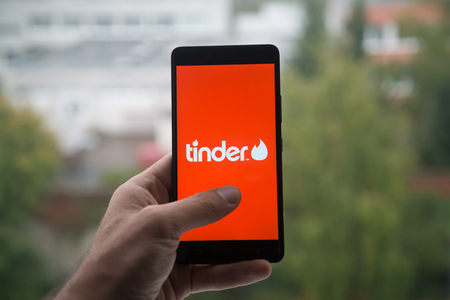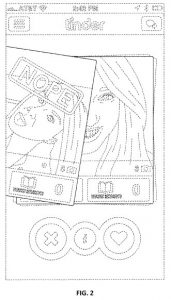 On Friday, March 17th, Dallas, TX-based online dating app developer Match Group filed a suit in the Western District of Texas alleging claims of utility and design patent infringement, trademark infringement, and trade secret misappropriation against Austin, TX-based dating app provider Bumble. Match alleges that Bumble, which was founded by former employees of Match’s Tinder dating service, copied major elements of the interface from Match’s app including swiping elements used to identify potential matches.
On Friday, March 17th, Dallas, TX-based online dating app developer Match Group filed a suit in the Western District of Texas alleging claims of utility and design patent infringement, trademark infringement, and trade secret misappropriation against Austin, TX-based dating app provider Bumble. Match alleges that Bumble, which was founded by former employees of Match’s Tinder dating service, copied major elements of the interface from Match’s app including swiping elements used to identify potential matches.
Patents being asserted by Match Group in this case include:
- U.S. Patent No. 9733811, titled Matching Process System and Method. Issued last August, it covers a computer implemented method of profile matching which involves swiping gestures associated with graphical representations of user online-dating profiles.
- U.S. Patent No. D798314, titled Display Screen or Portion Thereof With a Graphical User Interface of a Mobile Device. Issued last September, it covers aspects of the swiping graphical user interface design used by Tinder.
Match Group also notes that it holds a federal trademark for the standard character mark “swipe” for use in connection with computer application software for social introduction and dating services on mobile devices. Although Match is still seeking federal trademark registration for the terms “swipe right” and “swipe left,” it’s asserting common law trademark rights for the use of those terms in commerce extending back to March 2013.
Match notes that, beginning in December 2013, a series of Tinder employees left that company and, on the date that severance agreements ended for the first employees to leave Tinder, the dating app Bumble was allegedly founded by these former employees. Both Bumble and Tinder employ a swipeable online dating platform interface which requires a mutual opt-in before communication can be made; unlike Tinder, communication on Bumble can only be initiated by female users of the program. Both apps provide a match screen to denote when a match is made between two users and Match alleges that Bumble has made changes to the design of its match screen to more closely mirror Tinder’s match screen. Match also notes that Bumble employs a Backtrack feature which is distinctly different than a “rewind” feature that was developed for Tinder, but Bumble’s Backtrack feature closely mirrors an idea developed by Tinder employees before they left to join Bumble.
The comparisons between Bumble and Tinder have been noted by news media outlets, with at least one outlet calling the two apps virtually identical and another likening Bumble to a “feminist Tinder.” Match also cites statements made by Bumble’s CEO in news media interviews reference the swiping gestures made by users to indicate interest in another person’s dating profile. Bumble has also made direct references to swiping in its advertising as well as its app listing pages on both the Apple and Android app stores.
Perhaps the fact that Bumble has been likened to a “feminist Tinder” is to explain for why there is a somewhat lengthy Introduction to the complaint, which explains that this case is not about feminism. The complaint reads:
To be clear, this case is not about any Bumble personnel’s personal history with anyone previously at Tinder. This case is not about feminism or a business marketed based on feminist themes; Match applauds Bumble’s efforts at empowering women, both in its app and offline, and Match cares deeply both about its women users and about women’s issues generally. Rather, this case is simply about forcing Bumble to stop competing with Match and Tinder using Match’s own inventions, patented designs, trademarks, and trade secrets. Match brings this complaint to stop Bumble’s unlawful use of this intellectual property.
Match’s complaint lists eight causes of action including utility patent infringement, design patent infringement, federal trademark infringement, trade dress infringement and trademark dilution as well as violations of Texas state law on unfair competition and misappropriation of trade secrets. Match is seeking damages for violations of the Lanham Act, Defend Trade Secrets Act, Texas Uniform Trade Secret Act, total profits from the violation of the design patent as well as enhanced patent damages under 35 U.S.C. § 284.
Interestingly, recent news reports have reported that Tinder is planning to incorporate features from Bumble in an upcoming update to its own app. Tinder is reportedly looking to unveil a feature where women communicate with male matches before the male is able to communicate; female users of Tinder would be able to enable the feature if they so choose.
Image Source 123rf.com
Image ID : 88738978
Copyright : Peter Ksinan

![[IPWatchdog Logo]](https://ipwatchdog.com/wp-content/themes/IPWatchdog%20-%202023/assets/images/temp/logo-small@2x.png)


![[Advertisement]](https://ipwatchdog.com/wp-content/uploads/2024/04/Patent-Litigation-Masters-2024-sidebar-early-bird-ends-Apr-21-last-chance-700x500-1.jpg)

![[Advertisement]](https://ipwatchdog.com/wp-content/uploads/2021/12/WEBINAR-336-x-280-px.png)
![[Advertisement]](https://ipwatchdog.com/wp-content/uploads/2021/12/2021-Patent-Practice-on-Demand-recorded-Feb-2021-336-x-280.jpg)
![[Advertisement]](https://ipwatchdog.com/wp-content/uploads/2021/12/Ad-4-The-Invent-Patent-System™.png)







Join the Discussion
4 comments so far.
Fernando Ardenghi
March 29, 2018 04:10 amNow Bumble is suing Match Group for USD 400 Million (via RecodeNet)
IT IS A RUSSIAN – USA WAR
It is said Badoo is run by Russian Mafia in the spyware business.
Now they are in big war with Tinder (Match Group)
Perhaps Russians from Badoo hacked / will hack Match Group to demonstrate they used to create / they create fake profiles from inside to entice customers to subscribe.
To incinerate Match Group ala AshleyMadison case via a new “Impact Team” case?
Paul Morinville
March 29, 2018 12:15 amAnother trade secret case is being brought against former employees who leave to start their own company. It is now becoming a weekly occurrence.
Perhaps employers should be allowed to give frontal lobotomies to employees immediate following exit interviews.
Fernando Ardenghi
March 27, 2018 03:44 pmPlease see another LAWSUIT Match Group, LLC (MTCH) v. Tantan Ltd. (MOMO)
Please remember also
When Match Group (fka IAC Personals) bought OKCupid (7 years ago) for an astronomical amount of money, the OKCupid team had the task to copycat Badoo, but they failed in that mission.
IAC / Match Group “acquired” HatchLabs to “develop” Tinder copycat of Badoo.
Then Badoo backed Bumble to fight back and destroy Tinder (last December 2014).
Fernando Ardenghi
March 27, 2018 03:42 pmMatch Group Is Defending Itself In A Patent Lawsuit Filed In January 2018 By PersonalWeb Technologies
Personal Web Technologies, LLC et al v. Match Group, LLC et al